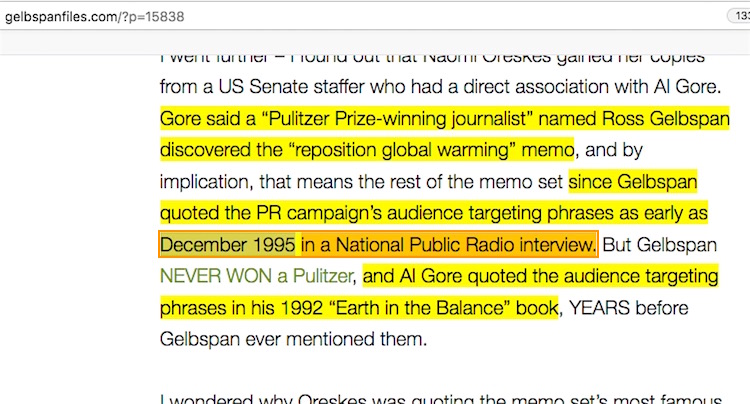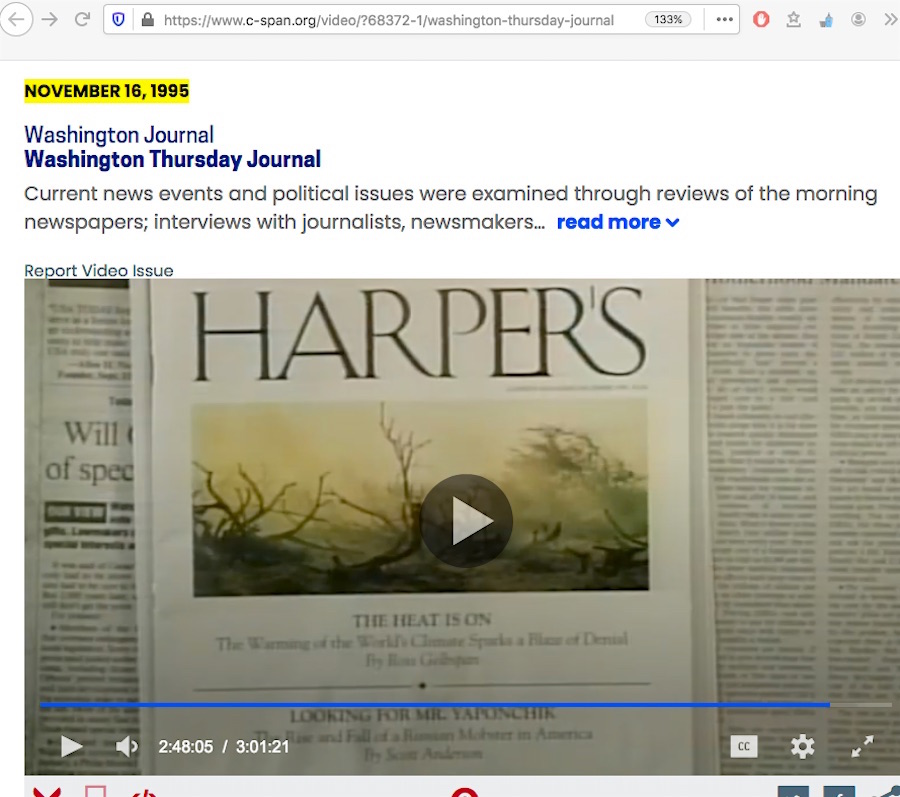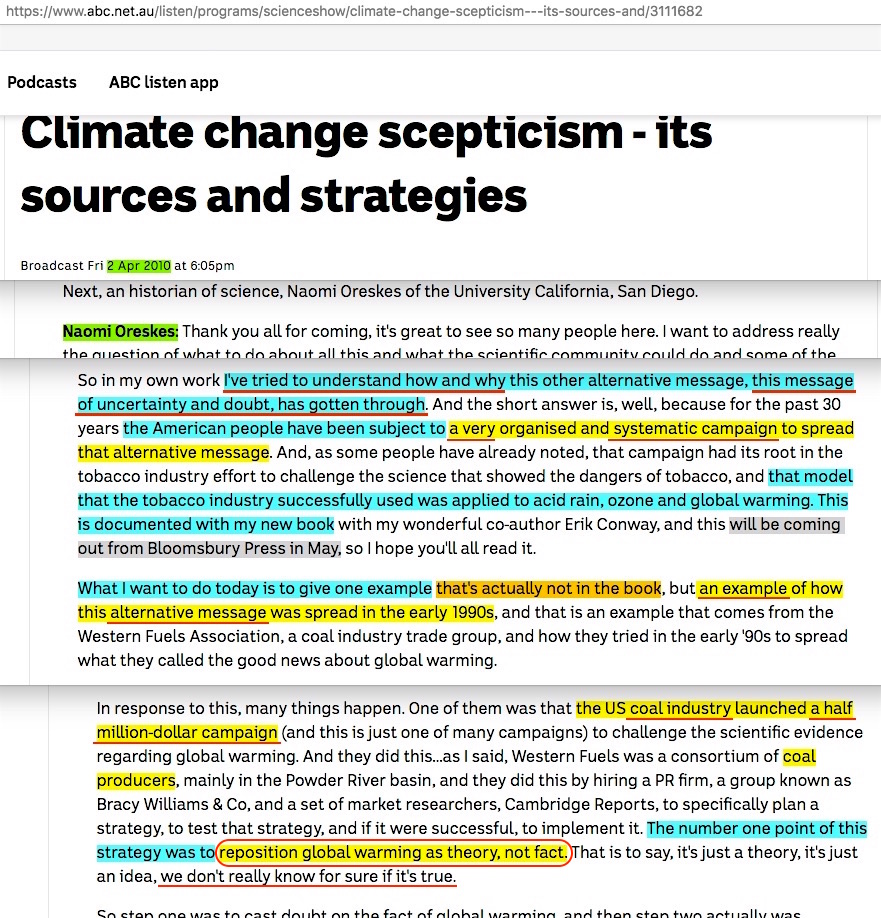The setup here is elemental. In the movie companion book for Al Gore’s 2006 “An Inconvenient Truth,” he said outright that the namesake of my blog, Ross Gelbspan, had discovered the notorious ‘leaked fossil fuel industry memo’ “reposition global warming as theory rather than fact,” one page in an extended set attributed to a coal industry public relations campaign which allegedly had sinisterly targeted (Gelbspan’s words, in a 1997 radio show interview) their ‘disinformation’ very narrowly at “older, less-educated men” and “young, low-income women.” It turns out that the PR campaign never operated under a directive to ‘reposition’ anything, and in one obscure instance, Gelbspan himself revealed that an official of the PR campaign said their climate issue information was directed at everyone within their audience.
On many occasions here at GelbspanFiles when I’ve said Al Gore’s story doesn’t line up right (e.g. the screencapture example below) about Gelbspan’s ‘discovery,’ I’ve pointed out that Gelbpsan’s earliest-seen quotes of those memo set phrases trace back as early as his December 5th, 1995 National Public Radio interview.

I’m not wrong at all about Gore quoting the never-implemented audience targeting phrases from that memo set years before Gelbspan ever said a word about them. The unanswered problem remains: how could Gelbspan discover memos which Gore already had? What I need to correct is when Gelbspan’s earliest mention of those phrases happened.
It’s earlier, it doesn’t erase Gore’s fatal assertion, and it’s one increment more problematic for Gelbspan, in a way not especially different from the way Naomi Oreskes inexplicably omitted those “reposition global warming” memo phrases from her first major media splash efforts to impugn the integrity of skeptic climate scientists.
The backstory here, for the newest of readers of GelbspanFiles, is that back in October 2009, I had re-read an account of Gelbspan’s exposure of ‘crooked skeptic climate scientists’ within a week of ex-Seattle Post-Intelligencer reporter Robert McClure declaring that Gelbspan was the first of many journalists to expose that specific corruption. I asked McClure to share those other journalists’ reports; he didn’t, so I set out myself to find them – specifically for ones that led to the actual ‘leaked memos’ in order to read them in full context. As I described in my October 22, 2015 blog post, it took me seven solid months to find the parts of the set that could be found, that’s how deeply the “reposition global warming” memo set itself was buried in Greenpeace Investigations scans archive pages. I stumbled across those (now vanished) via site-specific text searches inside of their site only after I was able to see how the old forgotten Ozone Action group was connected to Greenpeace USA.
The key difficulty in my initial search, as I sifted through all the superficial quotes of any parts of that worthless memo set, was to find any instances revealing where the set itself might be located. It was relatively easy to find results of other people’s quotes of the “reposition global warming” phrase itself prior to Gelbspan’s big 1997 hardcover book media splash about them. But he never disclosed where, when and how he learned of the memos’ existence, so I wanted to pinpoint when the event might have happened via finding his first public mention of them.
He’s been utterly silent – almost, I should say – about the 1996 situation of John Passcantando’s Ozone Action group and him jointly ‘obtaining’ the memo set. Somewhere along the line, I found him mentioning the memo set at the December 1995 NPR radio interview.
I found that interview transcript via a Google text search because Gelbspan’s accusation phrases were typed out within the transcript. It’s how I found almost all of the references I have for the phrases. I fortuitously spotted Al Gore’s “Earth in the Balance” book’s quote of the targeting phrases, however, while thumbing through it at a used bookstore. Marc Morano at Climate Depot permitted me to have a guest post at his site about that discovery in 2011.
Another fortuitous event arose for me just two days ago out of the mighty Google corporation’s random new dislikes of some of my searches, demanding me to prove I’m not a bot searcher. Since I refuse to capitulate to anything where they can confirm an identity to me in those instances, I switch to less-adept search engines, such as Luxxle, which seems incapable of differentiating between months-old search results and others dating back to 1995. But in the case of my effort to simply see if anyone had mentioned Ross Gelbspan within the last month, they provided me with a C-SPAN link result which itself in turn contains two video links about him dating back to 1997 and 1995.
There’s no way I would have found that video through an internet search of the “reposition global warming” phrase. The C-SPAN “Washington Journal” Thursday edition video interview of his commentary contains no transcript of that section within the three hour show at all. It was a slog through the whole video to pull the slider nearly to end where I finally spotted an important identifier popping up in the thumbnail views — the just-published Harper’s December 1995 issue featuring his cover story-highlighted article, “The Heat is On.”

Did he basically offer a bombshell news item in that phone-in interview, just like Naomi Oreskes did in a 2010 discussion about the upcoming publication of her “Merchants of Doubt” book?
Yes, he did. (hold the thought about Oreskes’ interview, I’ll wrap up this post with it)
Gelbspan’s interview begins at the 2:47:55 point. Interviewer Susan Swain segues into it by mentioning her prior discussion with a House representative and a lobbyist coinciding with the timing of his guest appearance:
The timing of this conversation with you is interesting because we’ve just finished a conversation on congress and money, and you make the point here about the role of money in influencing policy debate, specifically on ecological issues. Tell us what your point of view is on this.
To which Gelbspan responds,
In particular, what I find very interesting is, not all ecological issues, but in the issue of the global climate and the global warming debate, what I find is that the public has generally thought that the issue is mired in scientific uncertainty, we really don’t know what’s happening in the global climate, but in fact that turns out not to be true, it turns out that about 2500 of the top scientists of the world working with the United Nations have declared in fact that global warming is underway, but that the energy industry, or elements of it, have used a very small number of scientists and put a great deal of money to publicizing their alternative points of view to give the public that misinformation.
Interviewer Swain didn’t challenge Gelbspan to explain what the evidence was for his claim of 2500 scientists in the UN’s IPCC or ask whether it might be a significantly embellished figure straying into misinformation territory. She instead asked for a ‘for instance’ that would back up his claim regarding industry-funded disinformation. He delivered.
A ‘for instance,’ for example, is a program that began in 1991 called the ICE program, which was financed by the coal utilities. This was a half million dollar public relations campaign, and its strategy was to reposition global warming as theory rather than fact, to use a couple of these scientists Dr Balling, Dr Michaels and Dr Idso, to target older, less-educated men and young, low-income women in districts where they get their electricity from coal, and they have congressional representatives on the Energy Committee. This program fell apart after it was exposed in the media, but it’s an example of the kind of disinformation that’s financed by lots and lots of money from the energy industry.
I knew what was coming the millisecond he said “the ICE program,” he’s become that predictable to me now from his assorted nearly identical disinformation repetitions I’ve read or watched.
What’s intriguing about this earliest mention of those non-ICE, never-implemented phrases is where my above-noted comparison to Naomi Oreskes comes in.
In his Harper’s December 1995 article – just weeks or days, even, from hitting the newsstands at the time of his C-SPAN interview, he never mentioned a solitary thing in his article about the ICE (Information Council for the Environment) PR campaign, and certainly nothing about skeptic climate scientists being paid fossil fuel money to reposition anything or about any disinformation campaign targeting any older/younger uneducated or poor people. Not a word. You can read the entire article reproduced in old Sierra Club webpages to see for yourselves. But his second career is built on the “reposition global warming / older men / younger women” phrases that are in his 1997 “The Heat is On” book. Al Gore is not the only one (falsely) claiming Gelbspan ‘discovered’ / ‘uncovered’ / ‘unearthed’ those memos. And yet, the very article that paved the way to his book of the same name doesn’t say a thing about the phrases that earned him all the fame he has to this day.
Naomi Oreskes’ second career is also built on those never-used phrases. Her ‘928-to-zero’ 2004 study published in Science magazine about the same “consensus” Gelbspan spoke of nine years earlier in this C-SPAN interview (2:51:27 point) was just a one-hit wonder in the general public media, seen technically without obvious enough credit to her in Al Gore’s 2006 “An Inconvenient Truth” movie as a mere segue for him to launch into his own accusation less than a minute later about the “reposition global warming” memos. As I showed in my March 31, 2022 blog post, her subsequent fame started growing out of her 2007-2008 lecture show circuit presentations under the “You Can Argue With the Facts” banner where those worthless “reposition global warming” memo items were the feature attraction. They were again the feature attraction of her Nov 2021 UK Guardian article, where she could not even get the official name of the ICE campaign right.
But when her 2010 “Merchants of Doubt” book was released to the world, it contained no mention of the ICE campaign whatsoever. Not a word about “smoking gun evidence” proving skeptic climate scientists were paid to reposition anything in disinformation campaigns targeting any older/younger uneducated/poor people.
And yet, she felt compelled to bring up that point about the “reposition global warming” phrase in a 2010 Australian TV interview after first noting her book’s month-forthcoming publication.

Notice the other words Gelbspan used in in his November 1995 interview – “we really don’t know what’s happening” / “an example” / “alternative points of view” / “coal utilities / “a half million dollar public relations campaign” / and – not seen in my transcriptions above but during his next bits – 2:51:55, “a very systematic campaign” and just before that, 2:51:22, “I really began to look into why the public confusion existed”
What are the words seen in the above screencapture from Oreskes fifteen years later?
“I’ve tried to understand how and why this … has gotten through” / “a very systematic campaign” / “an example” / “alternative message” / “coal industry” / “a half million-dollar -campaign” / “we really don’t know for sure if it is true”
Sheer total coincidental wording about their beloved “reposition global warming” accusation? Or were they using a talking point template somebody prepared for them to dutifully regurgitate? Far more important to ask, though – why was such “smoking gun leaked memos evidence” not seen in either Gelbspan’s first big nationwide media splash or Naomi Oreskes’ first big international media splash? Is it because objective examiners at either publication houses might have consulted with legal analysts about those memos whose assessment might have been that it was a really iffy accusation that could come back to bite them?
Just askin.’
————————————————————————
There’s more, there always is. In Part 2: despite the brevity of this 1995 C-SPAN interview, Ross Gelbspan – future-channeling Oreskes – just couldn’t keep his stories straight, and couldn’t keep mouth shut about questionable details.
